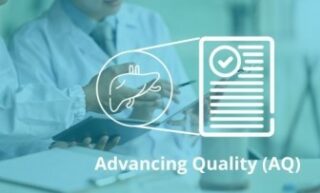Q Exchange
Advancing Quality for decompensated liver disease (DLD)
- Proposal
- 2022

Meet the team
Also:
- Tom Jenks
- Jacqui Baker
- Ruth Yates
- Anna Percy
- Eileen McDonagh
- Lismy Cheripelli
What is the challenge your project is going to address and how does it connect to the theme?
The Covid19 pandemic exacted a heavy toll on patients with decompensated liver disease (DLD). The evidence suggests that the pandemic has had direct and indirect effects on DLD patients, including delays in care, psychological strain, and increased alcohol use. Rates of admission for DLD more than doubled in the most deprived areas, and service provision varies significantly across the region.
Since 2008, the Advancing Quality (AQ) programme has worked to reduce unwarranted variation in patient care, helping care providers to reduce avoidable hospitalisation, ill health, and premature death. We do this by collecting, analyzing and reporting data against clinically agreed measures in line with national guidelines. This informs our improvement work.
In 2020, we expanded the programme to include DLD patients, with 11 acute trusts participating to improve DLD care. Our analysis of DLD data shows that there is considerable unwarranted clinical variation in care delivery, which this project will help to address.
What does your project aim to achieve?
The AQ programme is funded from reserves and we are seeking funding to further our support for our existing participating teams to improve, and to increase participation in the AQ programme for DLD across the North West. This will enable more providers access robust, validated data on their care delivery with support to improve, and more patients with liver disease can benefit from increased care quality. Our DLD patient data is linked into SUS records enabling us to provide insight on care delivered to our most deprived patients to support providers to tackle inequality.
Our DLD measures describe what good care looks like for DLD patients, and by supporting providers to deliver the best quality care to every patient, every time, we will help to tackle inequality.
How will the project be delivered?
Our AQ team have expertise in improvement support, analytics and project management and will deliver the project by:
- Producing further in-depth analysis of our data; linking to regional and national datasets to generate deeper insights on health inequalities.
- Expanding our existing virtual learning platform (The Hub) to develop new DLD e-learning resources, such as animated videos and interactive modules alongside our bespoke improvement support (QI support available to North West trusts only).
- Delivering virtual events to share our findings, showcase improvement work and act as a resource for developing practice by inviting influential guest speakers in the field.
- Growing our network of DLD improvers by creating a virtual space for sharing knowledge and experience.
We will demonstrate the impact of the project by evaluating improvements from our DLD clinical measure data, levels of participation from providers, the evaluation of our events, use of resources and completion of the Hub module.
How is your project going to share learning?
The AQ programme regularly publish case studies, reports and presentations to showcase the work of the improvement teams that we work with, and also identify opportunities to improve. We have shared and promote our resources using our online and social media platforms. We will use this expertise to produce further case studies and resources for DLD, to share across our improvers network and with the Q community. We will work to expand our network beyond the North West to promote learning and best practice across the country.
How you can contribute
- Help to identify existing networks outside our region which we could link in with to share knowledge and experience and who may be able to provide hands-on QI support to increase participation in our programme
- Information about other other ongoing improvement work in liver disease
Plan timeline
| 1 May 2022 |
|---|